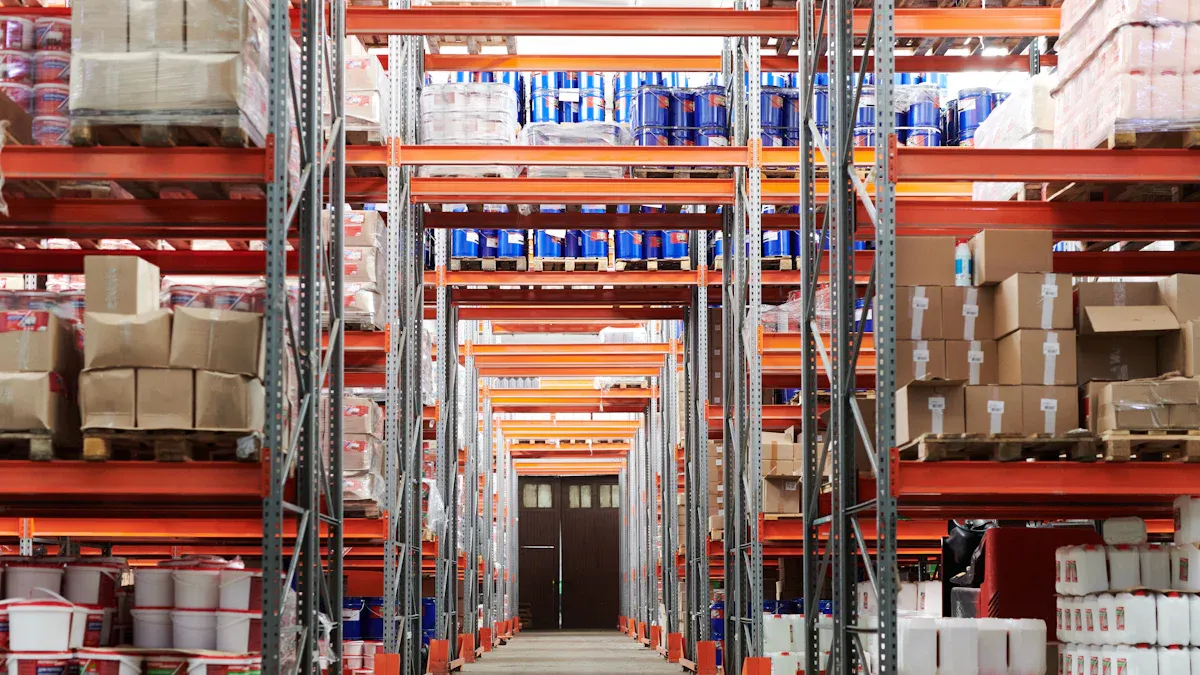Japan’s Automotive Supply Chain Market: Current Situation and Future Trends

Japan plays a pivotal role in the global automotive supply chain. It ranks as the fourth-largest automotive market worldwide, contributing 2.9% to its GDP and 13.9% to its manufacturing GDP. The sector generated $410 billion in shipments in 2019, representing nearly 19% of all manufactured goods. Its recovery directly impacts global economic stability, particularly in nations like the United States, where the auto industry relies heavily on Japan for uninterrupted parts production. As the industry evolves, trends like electrification and digital transformation are reshaping its landscape, driving innovation and sustainability.
Understanding Japan’s Automotive Supply Chain

Structure and Dynamics of the Market
Japan’s automotive supply chain operates with remarkable efficiency, driven by strong relationship governance and trust among stakeholders. Lower transaction costs compared to U.S. automakers highlight the system’s ability to mitigate inefficiencies through information exchange and collaboration. Companies within the supply chain balance integration and disintegration, adapting to competitive forces and the need for specialization.
The market size of Japan's automotive industry was estimated at 343.12 billion USD in 2023, with projections indicating growth to 366.81 billion USD in 2024. By 2035, the market is expected to reach 789 billion USD, reflecting a compound annual growth rate (CAGR) of 7.211% from 2025 to 2035.
Market Segment | Analysis Type | Time Frame |
|---|---|---|
Automotive Motors | Comprehensive quantitative analysis | 2019-2033 |
Key Players and Their Contributions
Japan’s automotive supply chain thrives due to contributions from key players like Toyota, Honda, and Nissan. Toyota leads with a 30% market share, followed by Honda at 14% and Nissan at 11%. Collectively, Japan produces approximately 10 million vehicles annually, showcasing its manufacturing prowess.
The manufacturing segment accounts for 41% of the Japan road freight transport market share in 2024, underscoring its importance in logistics. Additionally, eight major electrical product manufacturers contribute yearly sales of around USD 407 billion, further strengthening the supply chain’s ecosystem.
Japan’s Role in the Global Automotive Supply Chain
Japan plays a critical role in the global automotive supply chain, serving as a hub for innovation and high-quality production. Its ability to maintain strong supplier relationships and exchange information efficiently ensures seamless operations across borders. The country’s automotive industry supports global markets by providing essential components and vehicles, influencing economies worldwide.
With its projected market growth and contributions from leading manufacturers, Japan remains indispensable in shaping the future of the automotive supply chain. Its emphasis on trust, collaboration, and technological advancement positions it as a global leader in the sector.
Challenges and Opportunities in the Automotive Supply Chain
Addressing Sustainability and Environmental Goals
Sustainability has become a cornerstone of the automotive supply chain, as manufacturers face increasing pressure to reduce their environmental impact. Companies are adopting measures to lower emissions, conserve resources, and enhance recycling practices. For instance, the automotive sector achieved a 20% reduction in operational emissions between 2021 and 2023 by transitioning to renewable energy and improving energy efficiency. However, emissions across the entire value chain remain insufficient to meet global climate goals, necessitating further advancements in electrification and sustainable sourcing.
Natural disasters have historically disrupted automotive supply chains, as seen after the 2011 earthquake and tsunami in Japan, which caused significant supply issues for manufacturers.
A closer look at sustainability performance indicators reveals the industry's progress and areas for improvement:
Metric | FY2023 Data | Target/Result |
|---|---|---|
CO2 emissions (t) | Target: 3% or more | |
Energy consumption (kl) | 43,255 | Result: 4.96% |
Water consumption (1000m3) | 451 | N/A |
Recycled amount (t) | 9,370 | Recycling rate: 99.4% |
Final disposal amount (t) | 52 | N/A |
Despite these efforts, consumer behavior presents a challenge. An empirical survey revealed that only 34% of premium automotive brand customers consider sustainability an important factor when purchasing a vehicle. This highlights a gap between awareness and action, emphasizing the need for greater consumer education and engagement.
Overcoming Global Supply Chain Disruptions
Global supply chain disruptions have posed significant challenges for the automotive industry. Events like the COVID-19 pandemic and semiconductor shortages have highlighted vulnerabilities in the supply chain. In 2021, an estimated 7.7 million vehicles were lost in production due to supply chain complications. Recovery timelines for the automotive supply chain are projected to range from two to four years.
70% of major car manufacturers have experienced line stoppages due to supply chain issues.
An estimated 7.7 million vehicles were lost in production in 2021 because of supply chain complications.
Recovery for the automotive supply chain may take 2-4 years.
Japan's automotive supply chain has demonstrated resilience in the face of these challenges. The integration of digital procurement and advanced technologies, such as AI and blockchain, has become increasingly important. These innovations enhance transparency, improve decision-making, and optimize logistics. Additionally, the rise of Mobility as a Service (MaaS) and the focus on sustainable sourcing practices offer new opportunities for growth and adaptation.
Leveraging Technological Advancements in Logistics
The globalization of automotive manufacturing has expanded supply chains, creating a need for advanced logistics solutions to ensure timely vehicle delivery. The increasing demand for electric and hybrid vehicles has further complicated logistics, as these vehicles require the transportation of specialized components. To address these challenges, the integration of cutting-edge technologies has become essential in optimizing logistics operations within the automotive supply chain.
Technologies such as artificial intelligence (AI), blockchain, and the Internet of Things (IoT) are revolutionizing logistics by enhancing efficiency, transparency, and cost-effectiveness. AI-powered systems enable predictive analytics, allowing companies to anticipate potential disruptions and adjust their operations proactively. For instance, the World Economic Forum highlights that implementing AI and data analytics can boost logistics efficiency by 20%. Companies like DHL and FedEx are already leveraging these technologies to streamline their operations and improve service delivery.
IoT devices further enhance logistics by enabling real-time tracking and monitoring of shipments. These devices provide valuable data on factors such as temperature, humidity, and location, ensuring that components are transported under optimal conditions. The integration of IoT with AI creates a powerful synergy, enabling dynamic decision-making and improving overall supply chain performance.
Digital twin technology is another groundbreaking innovation transforming automotive logistics. By creating virtual replicas of supply chains, digital twins allow companies to identify bottlenecks and forecast market volatility proactively. This technology aids in optimizing logistics planning, resulting in more efficient operations and reduced costs. For example, strategic partnerships like those between Maersk and Sazgar Engineering Works demonstrate how collaboration and technology can enhance logistics solutions and operational efficiency.
The adoption of these technologies is driving growth in the global automotive logistics market. By leveraging AI, IoT, blockchain, and digital twin technology, companies can overcome logistical challenges and adapt to the evolving demands of the automotive industry. These advancements not only improve operational efficiency but also position the automotive supply chain for sustainable growth in the future.
Future Trends in Japan’s Automotive Supply Chain

Government Policies Driving Innovation
Japan’s government plays a pivotal role in shaping the future of its automotive supply chain through progressive policies and strategic investments. The country has prioritized the development of zero-emission vehicles (ZEVs), including battery electric vehicles (BEVs) and hydrogen-powered cars, to meet global sustainability goals. Subsidies for research and development in green technologies have accelerated innovation, while tax incentives encourage manufacturers to adopt eco-friendly practices.
The government’s focus on hydrogen technology is particularly noteworthy. Japan has positioned itself as a leader in hydrogen-powered transportation, with initiatives like the Hydrogen Energy Supply Chain (HESC) project. This strategy complements the rise of BEVs, creating a dual approach to sustainable mobility. By integrating these technologies, Japan aims to address diverse commuting needs, from urban travel to long-distance freight transportation.
Additionally, policies promoting digitalization in the automotive sector have gained traction. The government supports the adoption of software-driven systems that enhance vehicle connectivity and user experience. These advancements cater to younger consumers, who increasingly demand smart and interactive features in their vehicles. Japan’s commitment to innovation ensures its automotive supply chain remains competitive on the global stage.
Integration of Emerging Technologies (AI, IoT, Blockchain)
Emerging technologies are revolutionizing Japan’s automotive supply chain, enhancing efficiency, transparency, and security. Artificial intelligence (AI) enables predictive analytics, allowing manufacturers to anticipate disruptions and optimize operations. For example, AI-powered systems improve logistics efficiency by up to 20%, according to studies by the World Economic Forum.
Blockchain technology has gained significant traction in the automotive sector. It creates secure systems for tracking transactions, storing records, and confirming contracts without intermediaries. This technology simplifies audits and enhances accuracy in supply chain management. Blockchain’s ability to provide accurate tracking of products from production to delivery reduces fraud and builds trust among stakeholders.
Blockchain creates secure systems for tracking transactions.
It allows businesses to safely store records and confirm contracts without intermediaries.
This technology simplifies audits and enhances accuracy in supply chain management.
The global automotive blockchain market was valued at USD 10.56 billion in 2024 and is projected to reach USD 121.15 billion by 2032, growing at a CAGR of 35.66%. This rapid growth underscores the transformative potential of blockchain in supply chain operations.
The Internet of Things (IoT) further enhances logistics by enabling real-time tracking and monitoring of shipments. IoT devices provide valuable data on temperature, humidity, and location, ensuring optimal transportation conditions. When combined with AI, IoT creates dynamic decision-making capabilities, improving overall supply chain performance.
Expansion of Global Collaborations and Partnerships
Global collaborations and partnerships are reshaping Japan’s automotive supply chain, driving innovation and expanding market reach. Japan’s automotive industry actively participates in international standard-setting for EV and hydrogen technologies, ensuring compatibility and acceptance across borders. These efforts foster global cooperation and enhance the industry’s competitiveness.
Collaborative initiatives improve forecasting accuracy, enabling better decision-making and responsiveness to market changes. Partnerships also optimize transportation and inventory management, reducing costs and enhancing efficiency. For instance, strategic alliances between Japanese manufacturers and international logistics providers have streamlined operations, ensuring timely delivery of components and vehicles.
Benefit | Impact on Market Share/Innovation |
|---|---|
Leads to better decision-making and responsiveness | |
Faster response to market changes | Enhances agility and competitiveness |
Optimized transportation and inventory | Reduces costs and improves efficiency |
Enhanced customer service | Increases customer satisfaction and loyalty |
These collaborations extend beyond logistics to include joint ventures in research and development. By pooling resources and expertise, Japan’s automotive industry accelerates innovation in areas like electrification and autonomous driving. The expansion of global partnerships positions Japan as a leader in the automotive supply chain, ensuring sustainable growth and technological advancement.
Circular Economy Practices in Action
Japanese automakers have embraced circular economy practices by integrating recycled materials into vehicle production. For instance, manufacturers use recycled aluminum and steel to produce car components, reducing the demand for virgin materials. This approach not only conserves natural resources but also lowers production costs.
In addition, companies have adopted remanufacturing and refurbishing practices to extend the lifecycle of automotive parts. By reconditioning used components, manufacturers reduce waste and provide cost-effective solutions for consumers. These practices contribute to a more sustainable supply chain and support the transition to a circular economy.
Benefits of Resource Optimization
Resource optimization offers numerous benefits for Japan's automotive supply chain. It enhances operational efficiency, reduces costs, and minimizes environmental impact. By adopting circular economy principles, manufacturers can achieve long-term sustainability while maintaining competitiveness in the global market.
Moreover, resource optimization fosters innovation by encouraging the development of new materials and technologies. For example, advancements in material science have led to the creation of lightweight, durable components that improve vehicle performance and fuel efficiency. These innovations not only benefit the environment but also enhance the overall value proposition for consumers.
The shift toward a circular economy represents a transformative opportunity for Japan's automotive supply chain. By prioritizing resource optimization and waste reduction, the industry can achieve sustainable growth while addressing global environmental challenges.
Implications for Stakeholders in the Automotive Supply Chain
Opportunities for Foreign Suppliers and Innovators
Japan’s automotive supply chain offers significant opportunities for foreign suppliers and innovators. The correlation between innovation and market success in the automotive sector highlights the potential for companies that bring cutting-edge solutions to the table. In 2023, the top 20 automotive manufacturers sold nearly 50 million cars, accounting for over 66% of global car sales. This demonstrates the commercial advantage of innovation in capturing market share.
Foreign suppliers specializing in electric vehicle (EV) components, advanced materials, and software-driven systems can benefit from Japan’s strategic focus on electrification and digitalization. The country’s emphasis on zero-emission vehicles and hydrogen-powered technologies creates a fertile ground for partnerships and market entry. Companies that align their offerings with Japan’s sustainability goals and technological advancements stand to gain a competitive edge.
Strategies for Navigating Regulatory and Market Changes
Navigating Japan’s regulatory landscape requires strategic planning and adaptability. The government’s tax incentives for EVs reflect a shift toward enhancing competitiveness in the global market. Additionally, regulatory changes in employment systems aim to align workforce dynamics with market needs, impacting the automotive sector’s adaptability.
Evidence | Description |
|---|---|
Rise of Electric Vehicles | Tax incentives boost EV adoption, enhancing Japan’s position in the global market. |
Continuity and Change in Employment | Employment system reforms improve adaptability to market trends. |
Japan’s Safety Compromise | Relaxed safety standards reduce trade friction and tariffs, benefiting domestic and U.S. automakers. |
Foreign stakeholders must monitor these developments closely to align their strategies with Japan’s evolving policies. Proactive engagement with regulatory bodies and industry associations can help mitigate risks and capitalize on emerging opportunities.
Collaboration Between Domestic and International Players
Collaboration between domestic and international players drives innovation and strengthens Japan’s automotive supply chain. Joint ventures in research and development accelerate advancements in electrification, autonomous driving, and sustainable manufacturing. Partnerships optimize transportation and inventory management, reducing costs and improving efficiency.
Benefit | Impact on Market Share/Innovation |
|---|---|
Improved forecasting accuracy | Leads to better decision-making and responsiveness |
Faster response to market changes | Enhances agility and competitiveness |
Optimized transportation and inventory | Reduces costs and improves efficiency |
Enhanced customer service | Increases customer satisfaction and loyalty |
These collaborations foster global cooperation and ensure compatibility across borders. By pooling resources and expertise, stakeholders can address complex challenges and seize growth opportunities in the automotive supply chain.
Japan’s automotive supply chain remains a cornerstone of global manufacturing, driven by innovation, efficiency, and sustainability. Emerging trends, such as electrification, digital transformation, and circular economy practices, are reshaping the industry’s future. Stakeholders must prioritize collaboration and adopt advanced technologies like AI, IoT, and blockchain to stay competitive.
Recommendation: Companies should align with Japan’s sustainability goals, invest in green technologies, and foster global partnerships. Leveraging platforms like JUSDA’s intelligent supply chain solutions can optimize operations, reduce costs, and enhance resilience in an evolving market.
By embracing innovation and cooperation, stakeholders can secure long-term success in this dynamic industry.
FAQ
How does the circular economy benefit Japan’s automotive industry?
The circular economy reduces waste, optimizes resources, and promotes sustainability. Practices like recycling materials and remanufacturing parts lower production costs and environmental impact. These efforts align with global sustainability goals and enhance economic resilience.
Why is global collaboration important for Japan’s automotive supply chain?
Global collaboration fosters innovation, improves forecasting, and ensures compatibility across borders. Partnerships in research, logistics, and standard-setting strengthen Japan’s competitiveness and adaptability in the global market.
See Also
Maximizing Your Automotive Supply Chain's Hidden Capabilities
Transforming Logistics with AI: The Future Supply Chain
Expert Advice for Overcoming Automotive Supply Chain Challenges
